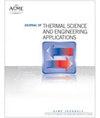雷诺数和齿前角对旋转迷宫密封泄漏损失和传热特性的影响
IF 1.4
4区 工程技术
Q3 ENGINEERING, MECHANICAL
引用次数: 0
摘要
摘要迷宫式密封是减少涡轮动叶顶部泄漏损失的有效方法。研究了不同转速、不同雷诺数和不同齿前角条件下篦齿密封性能的变化规律。三个雷诺数(Re = 6000, 10,000, 15,000),五种转速(Ta/Re = 0,0.01, 0.04, 0.08和0.1),以及三个齿前角(75度,90度和102.4度)已经引入。比较了不同工况下泄漏损失和换热的变化规律,并对流场和能量损失进行了详细分析。在相同雷诺数下,随着转速的增加,流量系数略有增加。这是由于高转速降低了节流损失和涡流损失。高转速增强了通道尖端壁面的换热,同时也减弱了齿腔底部的换热。此外,大齿前角时,迷宫的密封能力更好,这是由于定子上的摩擦损失和齿腔内的涡流损失减少所致。局部压力损失的变化也影响了沿通道的速度分布,这是局部努塞尔数变化的原因。本文章由计算机程序翻译,如有差异,请以英文原文为准。
Effects of Reynolds number and tooth front angle on leakage loss and heat transfer characteristics in a rotating labyrinth seal
Abstract The labyrinth seal is effective in reducing leakage losses at the rotor blade top in the turbine. This study investigates the variation in labyrinth seal performance at different rotational speeds, different Reynolds numbers, and different tooth front angles. Three Reynolds numbers (Re = 6000, 10,000, 15,000), five rotational speeds (Ta/Re = 0, 0.01, 0.04, 0.08, and 0.1), and three tooth front angles(75 deg, 90 deg, and 102.4 deg) have been introduced. The variation of leakage losses and heat transfer under different conditions is compared and a detailed analysis of the flow field and energy losses is performed. The discharge coefficient is increased slightly with increased rotational speed for the same Reynolds number. This is caused by the high rotational speed reducing the throttling loss and vortex loss. The high rotational speed enhances the heat transfer at the tip wall of the passage, and also weakens the heat transfer at the tooth cavity bottom. Additionally, the sealing capacity of the labyrinth is better at large tooth front angles, which is caused by the reduction of frictional losses on the stator and eddy current losses in the tooth cavity. The change in local pressure loss also affects the velocity distribution along the channel, which is the reason for the change in the local Nusselt number.
求助全文
通过发布文献求助,成功后即可免费获取论文全文。
去求助
来源期刊

Journal of Thermal Science and Engineering Applications
THERMODYNAMICSENGINEERING, MECHANICAL -ENGINEERING, MECHANICAL
CiteScore
3.60
自引率
9.50%
发文量
120
期刊介绍:
Applications in: Aerospace systems; Gas turbines; Biotechnology; Defense systems; Electronic and photonic equipment; Energy systems; Manufacturing; Refrigeration and air conditioning; Homeland security systems; Micro- and nanoscale devices; Petrochemical processing; Medical systems; Energy efficiency; Sustainability; Solar systems; Combustion systems
 求助内容:
求助内容: 应助结果提醒方式:
应助结果提醒方式:


